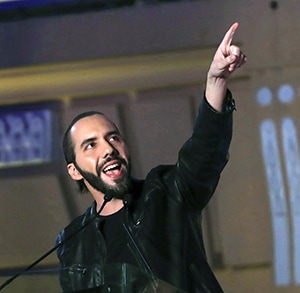A young politician takes the helm of a troubled nation.

Nayib Bukele, who garnered 53% of the vote as the presidential candidate of the center-right Grand Alliance for National Unity, has put a fresh millennial face on Salvadoran politics, ending his country’s two-party presidential dynasty. The 37-year-old president-elect, whose motorbike-inspired fashion sense and Facebook and Twitter rallies attracted young voters, has pledged to bring prosperity through a combination of fiscal discipline and social programs tackling gang violence.
It won’t be easy. “He faces three big challenges,” says Ricardo Castaneda, an economist with the Central American Institute for Fiscal Studies. “The first is meeting $2.4 billion in bond financing commitments between 2019 and 2024; the second is to fulfill the Fiscal Responsibility Law, which calls for a major increase in tax proceeds and a decrease in the fiscal deficit; and the third is to meet his campaign promises to improve security, health and education.”
Perhaps the toughest—and most imminent—of these hurdles is cutting El Salvador’s ballooning deficit, which the law mandates must come down to 0.7% of GDP from 3.2% of GDP currently. “That is a big and very drastic adjustment,” Castaneda says. “We will see what measures he brings forth.”
Much is expected of Bukele’s Cuscatlán Plan for modernization, including a boost in FDI to $1.2 billion this year and a rise in tax proceeds to 18.5% of GDP from 17.9% currently. He plans to accomplish the latter by, among other things, adding property taxes, reviewing tax incentives and restructuring the administration.
Formerly mayor of San Salvador, Bukele will also need to make good on his promise to improve security. Yet he has relevant experience. As mayor of San Salvador, Bukele implemented successful sports, art and education programs to keep youngsters out of gangs and cut crime in the capital city.
“He is a very talented negotiator, and this was seen in his San Salvador mayorship and in the fact that he won so many votes,” says Castaneda. “We see a very positive scenario, and I think he can bring calm for the country as well as the region.”



